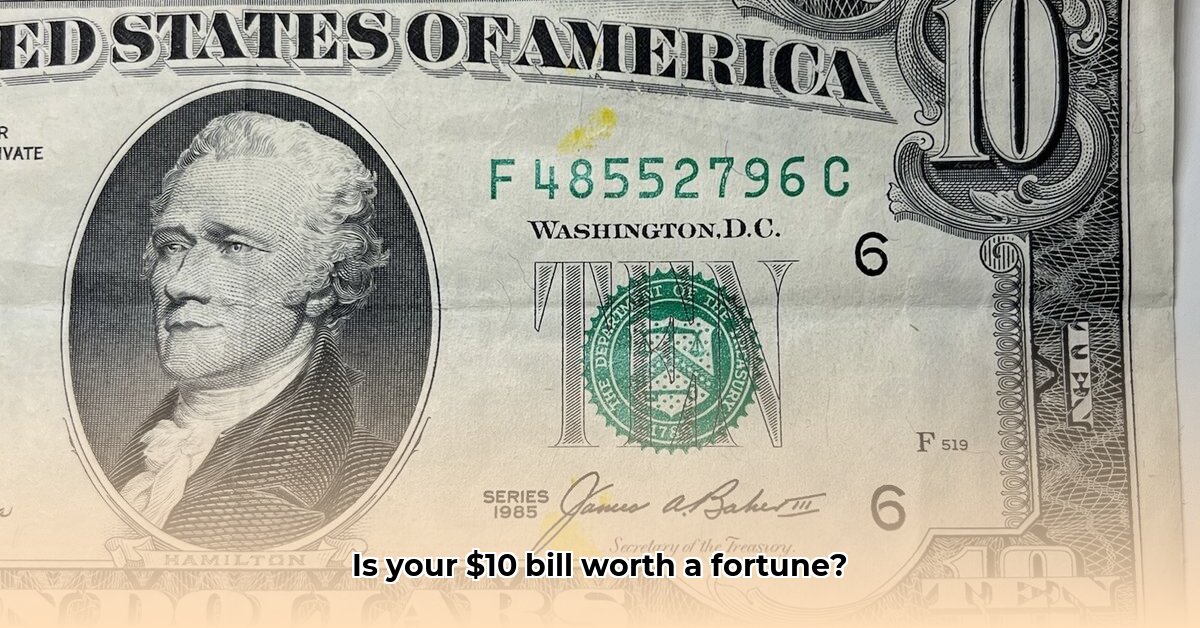
A seemingly ordinary 1985 ten-dollar bill could hold surprising value for collectors. This guide provides a step-by-step process to assess your bill's worth, from understanding grading systems to finding the best selling avenues. Let's uncover the potential hidden treasure in your hands. For more on coin valuation, check out this helpful resource on coin values.
Assessing Your 1985 Ten-Dollar Bill
The value of your 1985 $10 bill isn't simply $10. Its worth depends significantly on its condition and any unique features. This section details how to examine your bill for these key factors.
Condition: The Cornerstone of Value
A bill's condition is paramount. Numismatists (currency experts) use grading scales like the Sheldon Scale to assess this. A pristine, uncirculated bill is worth far more than a well-worn one. This simplified guide illustrates how condition impacts value:
| Grade | Description | Potential Value Range |
|---|---|---|
| Mint State (MS) | Perfect; uncirculated; virtually flawless | Hundreds of dollars (potentially more) |
| Extremely Fine (XF) | Minor wear; mostly excellent condition | Tens of dollars |
| Very Fine (VF) | Moderate wear; visible handling marks | A few to tens of dollars |
| Fine (F) | Significant wear; creases; possibly tears | A few dollars or less |
| Good (G) | Considerable wear; potential damage | Likely only face value ($10) |
(Note: Value ranges are estimates and can vary due to other factors.)
Visual examples (images would be inserted here) illustrating each grade would significantly improve clarity.
Identifying Special Features: Boosting Your Bill's Worth
Certain features significantly elevate a bill's value. Let's pinpoint these:
Star Notes: An asterisk (*) near the serial number indicates a replacement bill, making it rarer and more valuable. Are there any stars on your bill?
Fancy Serial Numbers: Repeating digits (e.g., 11111111), low numbers (e.g., 00000001), or other patterns are highly sought after by collectors. Do you see any unusual patterns in your serial number?
Federal Reserve District Identifier: The letter and number combination on the bill (e.g., G12) indicates its printing location. While the effect on value is generally minor, specific districts might slightly influence pricing. What district does your bill identify?
Photography: The Key to Accurate Appraisal
High-quality photography is critical for accurate appraisal and online sales. Take clear, well-lit pictures from multiple angles to showcase your bill's condition and unique features. Professional-level photos will maximize your chances of obtaining fair value.
Determining Your Bill's Value
After carefully examining your bill, it's time to determine its potential worth.
Online Resources: Helpful but Use with Caution
Websites like PaperMoneyWanted and SerialWorth offer price guides, but these are only estimates. Always cross-reference data from multiple sources to get a more accurate picture. Remember, this is an estimate, and actual market value will fluctuate. What are some specific factors considered by these sites?
Professional Appraisal: For High-Value Bills
If your bill is in exceptional condition or has highly desirable features, a professional numismatic appraisal is recommended. This provides an objective, expert valuation, particularly crucial for potentially high-value notes. How accurate are these appraisers, typically?
Understanding Market Fluctuations
Remember, collectible currency values fluctuate. Market demand, collector trends, and economic factors all impact pricing. Being aware that even the highest appraisal is a snapshot in time is essential for setting appropriate expectations. What are some market forces that could lead to value shifts?
Selling Your 1985 $10 Bill
Ready to sell? Here are your key options:
Online Marketplaces: Pros and Cons
Online marketplaces like eBay offer broad reach, but buyer protection and authentication processes matter. Specialized numismatic marketplaces cater to collectors, potentially leading to higher prices but typically with increased selling complexity. Would you expect a higher price on a dedicated numismatic site or on a general marketplace?
Numismatic Dealers: Convenience with Lower Returns
Numismatic dealers offer convenience and a quick sale but usually provide lower prices than auctions. This method is good for swift transactions but likely won't yield the top dollar that dedicated collectors might offer. How much might a dealer offer compared to an online sale?
Preservation and Storage: Maintaining Value
Proper storage is crucial for preserving your bill's condition and value. Use acid-free sleeves and archival-quality storage to protect it from light, moisture, and handling. These preventative measures will support your investment. What specific storage materials are generally recommended?
Conclusion: Your 1985 $10 Bill's Potential
Your 1985 ten-dollar bill's worth is determined by its condition, rarity, and market demand. By following the steps outlined here, you can accurately assess its value and make informed decisions about its future. Remember consistent, careful research is key to unlocking your bill's full potential.